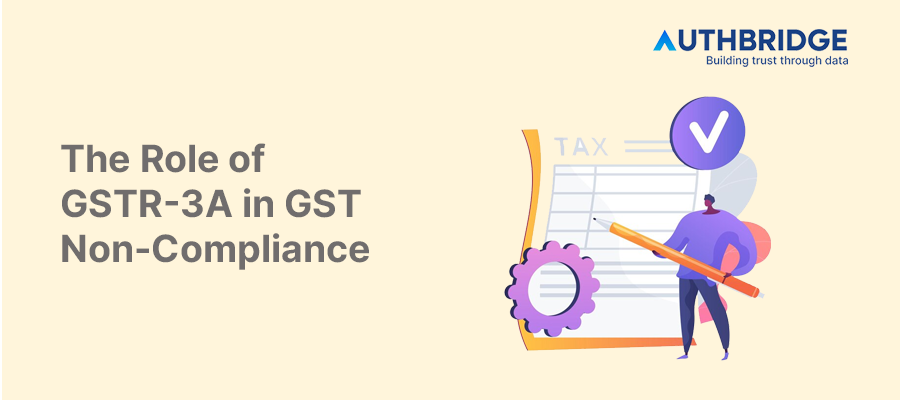Understanding GSTR-3A In GST Non-Compliance: Notices, Penalties, And Compliance Strategies

Overview of GSTR-3A in GST Compliance
GSTR-3A Notice serves as a non-compliance notification sent by the GST authorities to taxpayers who fail to file their GST returns within the prescribed timeline. It is a crucial tool in the GST framework to ensure timely compliance and collection of taxes.
Purpose of GSTR-3A Notice
The primary purpose of issuing a GSTR-3A Notice is to remind and urge taxpayers to fulfill their GST filing obligations. It acts as a prompt for defaulters to comply with the GST laws and avoid further legal actions and penalties.
Issuance of GSTR-3A Notices
Criteria for Issuing GSTR-3A Notices
GSTR-3A Notices are issued to taxpayers who have not filed their GST returns, including GSTR-3B (regular dealers), GSTR-4 (composition dealers), GSTR-5 (non-resident taxable persons), among others, within the due date.
Recipients of GSTR-3A Notices
Any registered taxpayer under the GST regime who fails to file the required returns becomes eligible to receive a GSTR-3A Notice. This includes businesses across various sectors and sizes, emphasizing the importance of regular GST compliance.
Contents of a GSTR-3A Notice
Key Components of GSTR-3A Notice
A typical GSTR-3A Notice includes the name and address of the defaulter, GSTIN, the period for which the return has not been filed, the date of the notice, and clear instructions for filing the overdue returns.
Understanding the Format of GSTR-3A Notice
The format of the GSTR-3A Notice is standardized and straightforward, designed to convey the non-compliance issue clearly and guide the taxpayer towards rectifying the default.
Actions Required After Receiving GSTR-3A
Immediate Steps to Take Upon Receipt
Upon receiving a GSTR-3A notice, taxpayers must:
- Review the notice carefully to understand the periods for which returns have not been filed.
- Prepare and file the overdue GST returns immediately.
- Pay any due taxes along with applicable interest and late fees to regularize their compliance status.
Consequences of Ignoring GSTR-3A Notices
Ignoring a GSTR-3A notice can lead to severe consequences, including heavy penalties, legal action, and in some cases, cancellation of GST registration.
Penalties and Late Fees for Non-Compliance
- Table 1: Penalties and Late Fees for Non-Compliance
Return Type | Late Fee (Per Day) | Maximum Penalty |
Annual Return | Rs. 200 (Rs. 100 CGST + Rs. 100 SGST) | 0.25% of State Turnover |
Other Returns | Rs. 200 (Rs. 100 CGST + Rs. 100 SGST) | Rs. 5,000 |
Interest | 18% per annum | Calculated on Outstanding Tax |
Calculation of Interest and Late Fees
Interest is calculated at 18% per annum on the outstanding tax amount, from the day following the due date till the date of payment. Late fees are imposed daily, with specific caps based on the return type.
Resolution and Compliance Post GSTR-3A
Filing Returns After Receiving GSTR-3A
Taxpayers should file the overdue returns within 15 days from the date of the GSTR-3A notice to avoid further penalties. Filing within this period can also lead to the withdrawal of the notice.
Withdrawing GSTR-3A Notices
If the taxpayer complies by filing the overdue returns and paying the due taxes within the specified period, the GSTR-3A notice can be withdrawn, reinstating the taxpayer's compliance status.
Best Practices for Avoiding GSTR-3A Notices
- Regular GST Return Filing: Maintain a strict schedule for GST return filings to avoid receiving GSTR-3A notices.
- Reconciliation and Compliance Checks: Regularly reconcile your books with the GST portal data and perform compliance checks to ensure all liabilities are met on time.
Conclusion
The issuance of GSTR-3A notices serves as a critical reminder for businesses to adhere to GST compliance requirements. Understanding the implications of these notices and taking prompt action upon receipt is essential for maintaining a good compliance record. Implementing best practices for GST filing and staying informed about GST regulations can help businesses avoid the pitfalls of non-compliance and ensure smooth operations.
Category

Abhinandan Banerjee
(Associate Manager - Marketing)
Abhinandan is a dynamic Product and Content Marketer, boasting over seven years of experience in crafting impactful marketing strategies across diverse environments. Known for his strategic insights, he propels digital growth and boosts brand visibility by transforming complex ideas into compelling content that inspires action.



